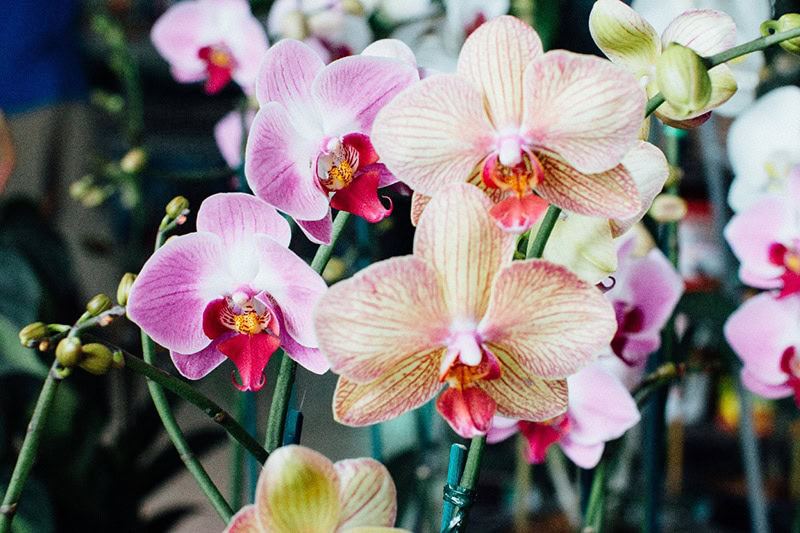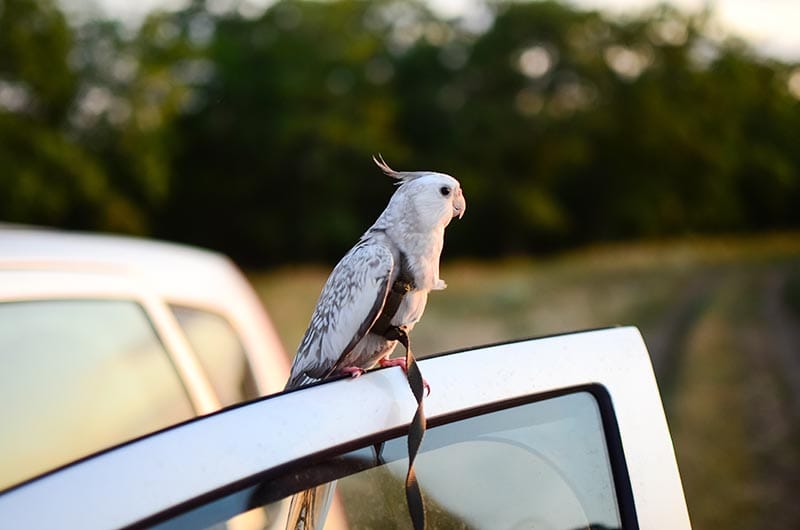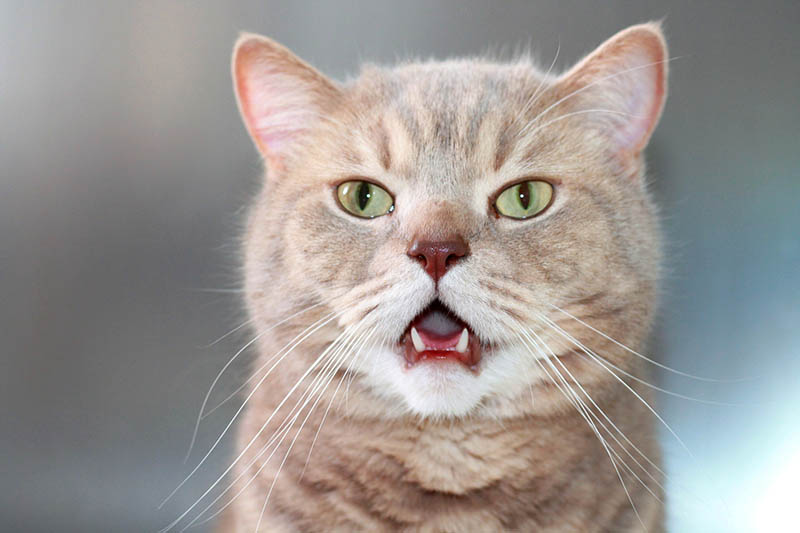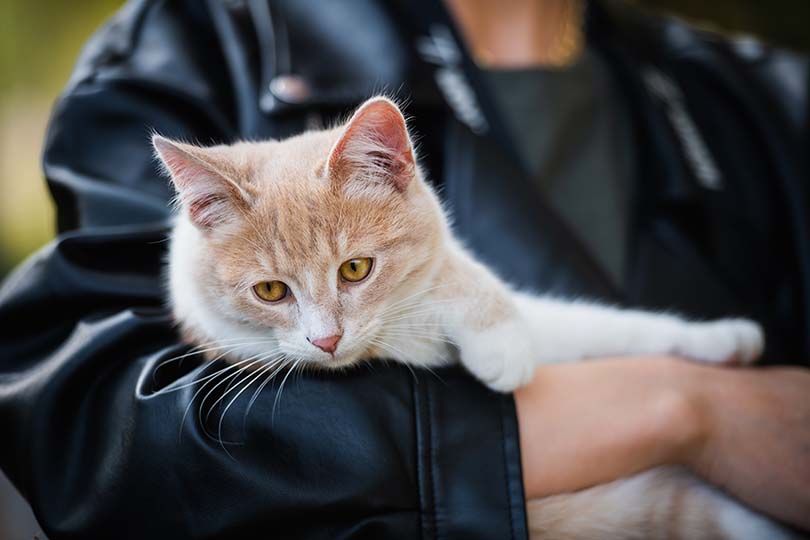VET APPROVED

The information is current and up-to-date in accordance with the latest veterinarian research.
Learn more »Click to Skip Ahead
If you’ve had cats, you know that many plants are poisonous and can harm your favorite feline. If you’re a fan of lovely, delicate, and unique flowers, that might lead you to ask whether orchids are poisonous to cats.
Luckily, most orchid species are safe for cats and won’t cause them any harm, even if they were to chew on a flower or two.

What Does the ASPCA Say About Orchids and Cat Safety?
The American Society for the Prevention of Cruelty to Animals (ASPCA) is an excellent source of information on what can and can’t hurt animals, including cats. The organization reports that the Phalaenopsis sp. orchid, also known as the Moon Orchid, is non-toxic to cats.
That’s good news because the Phalaenopsis orchid is the most popular commercially sold orchid on the market. In other words, if you have an orchid in your home, it’s highly likely to be the Phalaenopsis orchid and non-toxic for your cat.
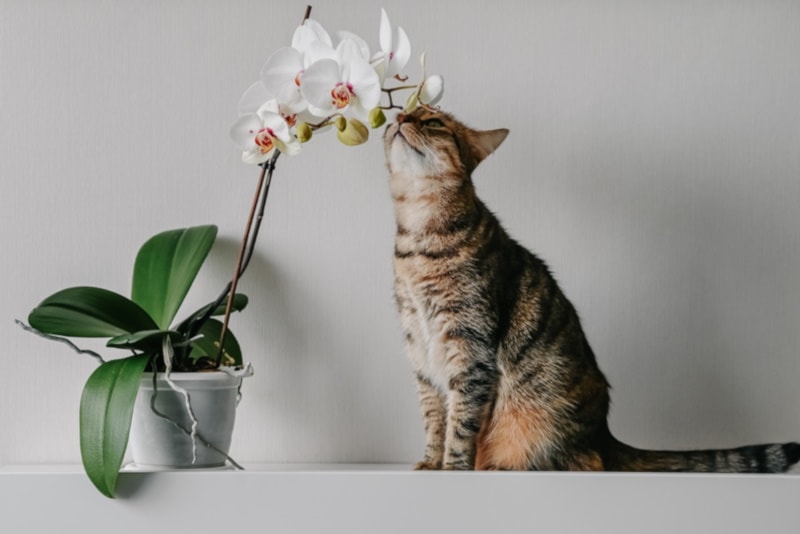
What Do Other Organizations Say about Orchids and Toxicity for Cats?
It’s important to note that there are many kinds of orchids. The Lady Slipper orchid (Cypripedium) might be irritating to cats, but only slightly. The Pet Poison Control Helpline, a service available in Canada, the United States, and the Caribbean, lists orchids as a “safe” plant for cats and other pets.
Lastly, PetMD, a trusted online information source for pet health and care, doesn’t list orchids on their list of plants that are poisonous to cats. It does list many others and is a great resource if you’re cat-proofing your home.
Can Cats Live in a House with Orchids?
Excluding the Lady Slipper orchid (Cypripedium), which might be toxic to cats, all other members of the orchid family (Orchidaceae) are non-toxic for cats. Therefore, cats can live in a home where orchids are grown and displayed.
One thing to remember is that cats are curious creatures that like to paw at some objects and knock them over. If your home has delicate orchids, you should place them where your cat can’t reach them. Depending on your cat, that might need to be in a room that’s off-limits to them.
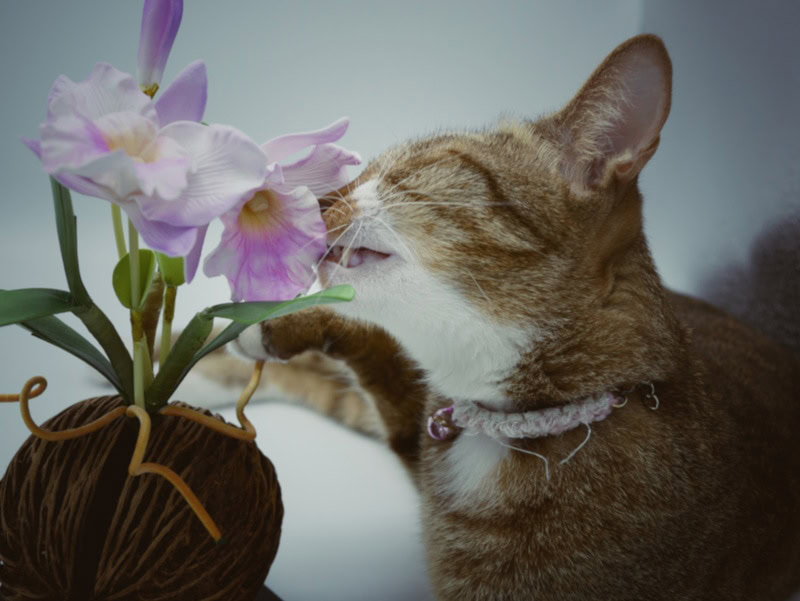
Will Cats Eat Orchid Petals and Leaves?
Although it’s not always something they seek out, your cat might be attracted to an orchid and decide to take a nibble. In some cases, they do it out of curiosity. In others, your cat might be eating your orchid’s leaves and petals because they have an upset stomach and want to make themselves vomit. This is more or less the same reason that your cat will occasionally eat grass.
If your cat does this and doesn’t eat much, it’s probably not a problem. However, if your feline friend is always eating your orchids, a consultation with a vet is recommended. Also, you should look into growing cat grass for your cat to nibble on instead.
How To Keep Your Cat from Eating Your Orchid Plants
The best way to keep a curious kitty from chewing on your beautiful orchids is to place the flowers where there’s no possible way your cat can get to them. However, if you know cats, you know that’s not always a viable solution.
Cats have an almost magical way of getting to anything they want; if that happens to be your orchids, they will usually succeed. The methods below might help but don’t expect them to be infallible.
1. Place Sticky-Sided Tape Around Your Orchids
Cats hate anything that sticks to their fur and will avoid it when possible. Placing sticky tape around your orchid is a good cat deterrent, at least temporarily.

2. Put Aluminum Foil Around Your Plants
Many, but not all, cats dislike aluminum foil because it’s shiny and crinkly. However, some cats don’t mind it, which renders this method useless.
3. Hang Your Orchids From the Ceiling
Most cats cannot get to plants when they’re attached to the ceiling and out of reach.
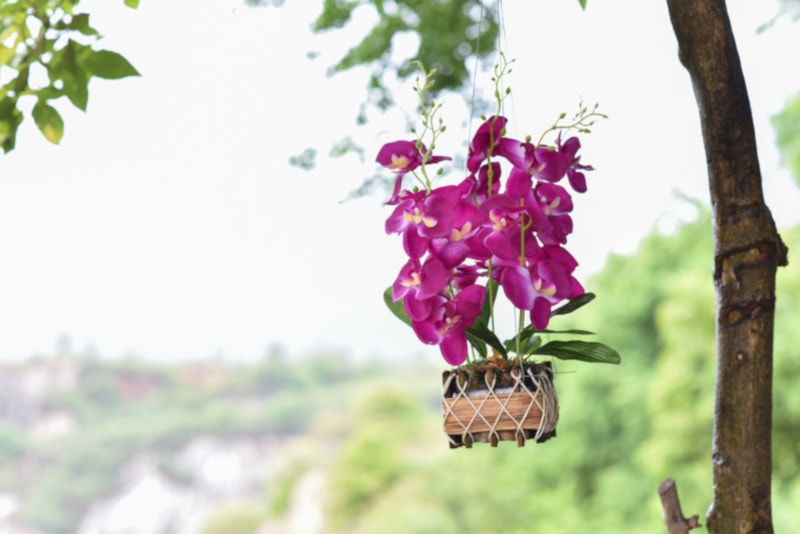
4. Give Your Cat an Alternative to Orchids
There are plenty of plants you can purchase that are safe for cats and more affordable than Orchids.
- Catnip
- Cat grass
- Valerian
- Spider plants
- Lemon Thyme

FAQ
Are Orchids Considered Toxic for Cats?
According to most sources, including the ASPCA, orchids are safe and non-toxic for cats.
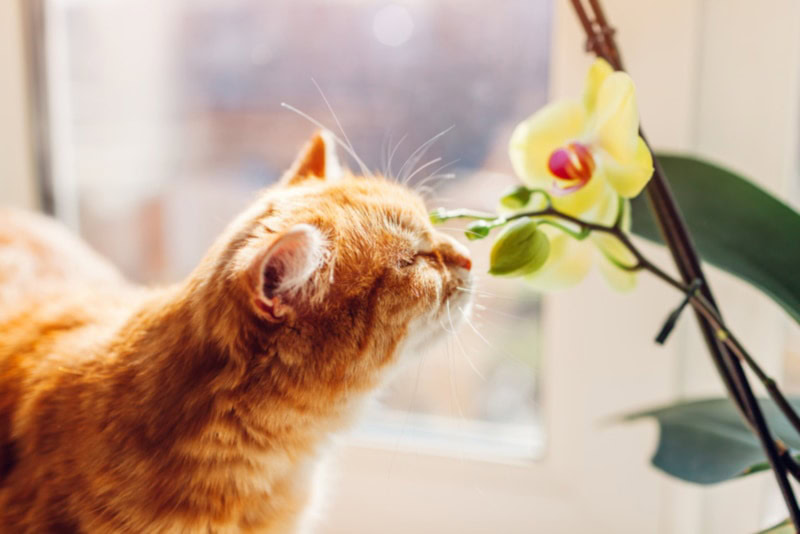
Are Any Orchid Species Considered Toxic?
The Lady Slipper orchid is listed as one species that might be slightly toxic to cats.
Can Cats Eat Orchid Leaves and Petals With Little or No Risk?
While they shouldn’t eat them, they can eat a small number of orchid petals or leaves without issues. However, a large amount might cause them a tummy ache.
Do Cats Need to Eat Orchids to Stay Healthy?
No, orchids are not part of a cat’s diet and are not required to stay healthy. There’s no reason to feed orchids to your cat.
What Should You Do if Your Cat Is Eating Several Plants Around Your Home, Including Orchids?
Take your cat to your veterinarian to rule out any medical issues behind this behavior.


Final Thoughts
Nearly all orchids are considered non-toxic for cats. That doesn’t mean they should eat them, but it means that they won’t get ill if they take a bite of an orchid occasionally. Only one orchid species we saw in our research was considered slightly toxic to cats, the lady slipper orchid (Cypripedium).
Of course, cats aren’t vegetarians and don’t need to eat plants to stay happy and healthy. That’s why a trip to your veterinarian is recommended if you notice that your cat is suddenly eating several leaves or petals. They might also be hungry, so be sure to feed your cat regularly!
See also:
- Are Daffodils Poisonous to Cats? Vet- Reviewed Facts & Care Tips
- Are Philodendron Toxic To Cats? What You Need To Know!
- https://www.petpoisonhelpline.com/pet-safety-tips/safe-plants-for-your-furry-friend/
- https://www.petmd.com/cat/emergency/poisoning-toxicity/e_ct_poisonous_plants
- https://www.maine.gov/dacf/mnap/about/cypripedium.htm
- https://www.aspca.org/pet-care/animal-poison-control/toxic-and-non-toxic-plants/phalaenopsis-orchid
Featured Image Credit: JumpStory
